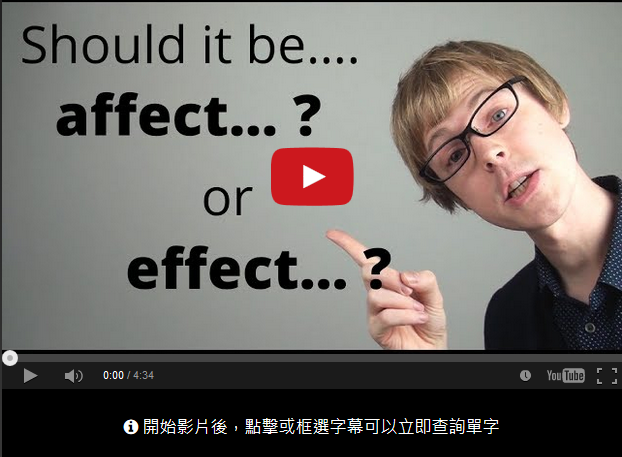當我們在背單字時
常常有看起來很像,念起來也很像的相似單字
但其實意思卻是完全不一樣!
就像雙胞胎兄弟的個性常常是南轅北轍
今天 VoiceTube 幫大家整理出 24 組最熟悉的陌生人
希望大家看過之後不要再搞錯囉!
advice vs. advise
1. 首先是發音,advice 的結尾是/s/,advise的結尾是/z/
2. advice 是不可數名詞,表示建議,勸告,忠告
e.g. Take my advice and leave right now!
聽我的話快滾吧!
3. advise是動詞,表示給予建議
e.g. I advised against their doing it .
我勸他們不要做這件事。
4. 接下來透過影片了解如何在口語中使用這兩個單字喔!
↓↓↓點擊以下連結可直接觀看影片↓↓↓
Advice, Advise的差異 (Advice, Advise)

affect vs. effect
1. affect 大多當作動詞使用,表示影響;對……發生作用
e.g. The amount of rain affects the growth of crops.
雨量影響作物的生長。
2. effect 大多當作名詞使用,表示某事物的後果或結果
e.g. This had a great effect upon the future of both mother and son.
這對母子倆的將來影響很大。
3. 而其實 affect 有時也可以當名詞使用,effect 有時也可當作動詞使用!
我們藉由以下輕鬆的影片更詳細的解釋這個用法
↓↓↓點擊以下連結可直接觀看影片↓↓↓
英語詞彙affect and effect (English Vocabulary: ‘affect and effect’ @doingenglish)

aisle vs. isle
1. aisle 是(戲院,列車,教堂等座席間的)通道,走道
e.g. He followed the usher down the aisle.
他跟著領座員沿著通道走過去。
2. isle 是小島
e.g. In a word, the isle was inhabited.
總而言之,這個小島曾經是有人居住的。
all together vs. altogether
1. all together 是個片語,解釋為在一個團體中聚集或聯合
e.g. I keep my books all together, so they’re easy to find.
我把我的書都放在一起,所以很容易找到。
2. altogether 是副詞,表示完全;總共;總之
e.g. I am altogether on your side in this matter.
在這個問題上我完全支持你。
e.g. He bought altogether 500 hectares of land.
他總共買了五百公頃土地。
e.g. Altogether, exports are looking up.
總的說來,出口貿易在好轉。
along vs. alone
1. along 當作介系詞的意思是沿著;順著
e.g. I was driving my car along a muddy path.
我沿著泥濘的小路開車。
2. along 當作副詞的意思是一起;去到
e.g. Come along with us.
跟我們一道去吧。
e.g. I‘ll be along in a minute.
我一會兒就來。
3. alone 當作形容詞與副詞時是單獨的,獨自的
e.g. She watches TV when she is alone.
獨自一人時,她便看電視。
e.g. I can do it alone.
我可以獨自辦理此事。
aloud vs. allowed
1. aloud 是副詞,代表大聲地
e.g. The hungry baby cried aloud.
餓了的嬰孩放聲大哭。
2. allowed 是動詞 allow 的過去式與被動語態,表示允許,准許
e.g. Swimming is not allowed at this beach.
這片海灘禁止游泳。
e.g. She allowed us to smoke.
她允許我們抽菸。
bare vs. bear
1. bare 是形容詞,表示裸的,光禿禿的,勉強的
e.g. The child was bare to the waist.
那孩子打赤膊。
e.g. All they had were the bare necessities of life.
他們所有的僅僅是生活必需品而已。
2. bear 當作動詞時是支持,承受;承擔
e.g. I can‘t bear to see you like this.
我不忍見你這樣。
born vs. -borne
1. born 是形容詞,代表誕生的;產生的
e.g. The baby was born last Friday.
孩子是上星期五生的。
2. -borne 是複合形容詞,表示運載的;輸送的
e.g. sea-borne trade
海上貿易
e.g. air-borne troops
空降部隊
break vs. brake
1. break 當動詞是打破;破壞,當名詞時是損毀;休息
e.g. They broke down the door with a big heavy log.
他們用一根粗大的木頭將門砸開。
e.g. There is a ten–minute break between classes.
課間有十分鐘休息時間。
2. brake 是剎車的意思
e.g. He braked his car just in time to avoid an accident.
他及時煞車,避免了一次事故。
censure vs. censor
1. censure 當作名詞或動詞是責備;譴責
e.g. The judge censured the driver but didn‘t fine him.
法官責備了司機但沒罰他款。
2. censor 當作名詞時是出版物、電影等的審查員,當作動詞時是審查
e.g. He censored the prisoners’ letters.
他檢查囚犯的信件 。
complement vs. compliment
1. complement 是補充物,補足物;配對物
e.g. Homework is a necessary complement to classroom study.
家庭作業是課堂教學的必要補充。
2. compliment 當作名詞與動詞時代表恭維;敬意
e.g. It‘s the nicest compliment I‘ve ever heard.
這是我聽到的最好的恭維話。
defuse vs. diffuse
1. defuse 是拆掉、消除,或是緩解緊張的情勢
e.g. We’re still trying to defuse the detonator.
我們還在試著能拆除引信。
e.g. The transfer defuses a tense situation on the Antarctic seas but activists said they will continue to harass the Japanese fleet.
此行動緩解了南極地區的緊張局面,但是活動人士說,他們將繼續騷擾日本捕鯨船隊。
2. diffuse 是使(熱、氣味等)四散,擴散(氣體等);使滲出
e.g. The roses diffuse the scent to the air miles around.
玫瑰花的香味彌漫在幾英哩的空氣中。
看完文章與影片後,以上12組單字大家都會分辨了嗎?
趕快做好筆記,下次VoiceTube再分享另外12組易混淆的單字
讓大家再也不會被這些Twins所迷惑囉!
作者:Derrick Chen
Resource:Top 24 Confusing English Words, Dictionary.com, Yahoo奇摩字典
Photo resource:Lindsey B, CC Licensed.
迫不及待想馬上開始練習嗎?
快打開 VoiceTube App 練英文!
✦ 立即下載 >>> https://bit.ly/myenglishissogood
英文單字不要硬背! 藉由 VoiceTube App 看影片,不會的單字反覆聆聽,加上單字測驗練習,聽寫齊下,立刻熟記!

